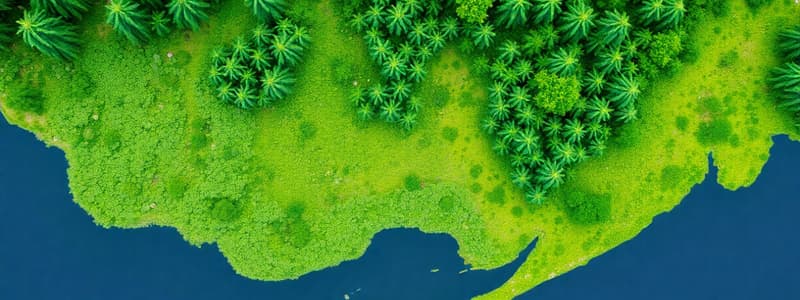Podcast
Questions and Answers
What defines a biome?
What defines a biome?
A biome is defined by a large area of the Earth with similar plants, animals, and climate.
What is the biosphere?
What is the biosphere?
The biosphere is the part of Earth where life exists, encompassing all living organisms and their environments.
How many biomes are found in Ontario?
How many biomes are found in Ontario?
There are four biomes in Ontario.
Name one characteristic of the deciduous forest biome.
Name one characteristic of the deciduous forest biome.
What defines the tundra biome?
What defines the tundra biome?
What is a population in ecological terms?
What is a population in ecological terms?
What role do frequent fires play in grasslands?
What role do frequent fires play in grasslands?
What are the two main types of biomes in the biosphere?
What are the two main types of biomes in the biosphere?
What is the hydrosphere?
What is the hydrosphere?
List two characteristics of a deciduous forest.
List two characteristics of a deciduous forest.
How does the soil quality differ between deciduous and boreal forests?
How does the soil quality differ between deciduous and boreal forests?
What is a similarity between the deciduous and boreal forests?
What is a similarity between the deciduous and boreal forests?
What influences the formation of biomes like deciduous and boreal forests?
What influences the formation of biomes like deciduous and boreal forests?
Flashcards are hidden until you start studying
Study Notes
Biome Overview
- A biome is a large ecological area with similar climate, plants, and animals.
- Examples of biomes include forests, deserts, and grasslands.
Biosphere Definition
- The biosphere encompasses all locations on Earth where life exists, including living organisms and their habitats.
Types of Biomes in Ontario
- Ontario features four main biomes:
- Deciduous Forest: Characterized by trees shedding leaves in autumn (e.g., oak, maple), diverse wildlife, and rich soil with four distinct seasons.
- Boreal Forest (Taiga): Dominated by coniferous trees (e.g., spruce, fir, pine), experiences cold climates with long winters and short summers, and has acidic, nutrient-poor soil.
- Tundra: Characterized by very cold temperatures, short growing seasons, the presence of permafrost, and low vegetation like mosses and lichens.
- Grasslands: Dominated by grasses, sparse trees, varied climates, and frequent fires which support the grassland ecosystem.
Ecological Relationships
- Individual Organism: A single living entity, e.g., a lion.
- Population: A group of the same species, e.g., a pride of lions.
- Community: Different populations living together, e.g., lions, zebras, and trees in a savanna.
- Ecosystem: A community plus its environment, e.g., the savanna including soil and water.
- Biome: A large area containing similar ecosystems and climates, e.g., the African savanna biome.
Components of the Biosphere
- Lithosphere: The solid outer layer of Earth, comprising rocks, soil, and landforms like mountains and valleys.
- Atmosphere: The layer of gases surrounding Earth, crucial for life, includes air we breathe (oxygen and carbon dioxide).
- Hydrosphere: Encompasses all Earth's water bodies, including oceans, lakes, rivers, and glaciers.
Terrestrial and Aquatic Biomes
- Terrestrial Biomes:
- Forests (tropical, temperate, boreal)
- Grasslands
- Deserts
- Tundra
- Aquatic Biomes:
- Freshwater (lakes, rivers, wetlands)
- Marine (oceans, coral reefs, estuaries)
Comparison of Deciduous and Boreal Forests
- Deciduous Forest:
- Trees lose leaves annually.
- Rich, fertile soil with diverse wildlife (e.g., deer, various birds).
- Experiences four distinct seasons.
- Boreal Forest:
- Composed mainly of coniferous trees.
- Has a cold climate with long winters and short summers.
- Soil is acidic and nutrient-poor, habitats for species like moose and wolves.
Similarities Among Biomes
- All biomes contain unique plants and animals adapted to specific climates.
- Climate and geographic conditions shape each biome.
- Every biome is an integral part of the Earth's biosphere, contributing to the overall system of life.
Studying That Suits You
Use AI to generate personalized quizzes and flashcards to suit your learning preferences.




